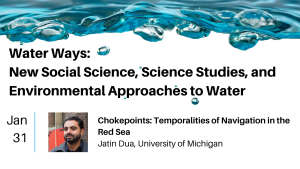Presented By: Institute for Social Research
Chokepoints: Temporalities of Navigation in the Red Sea
Water Ways: New Social Science, Science Studies, and Environmental Approaches to Water

Chokepoints: Temporalities of Navigation in the Red Sea
Jatin Dua, University of Michigan, Anthropology
Monday, Jan. 31, The Open Talks will be held noon to 1pm, and the Grad Workshops will be held 1 to 3pm.
Zoom Link: https://umich.zoom.us/j/95385019774?pwd=N0I1THZGYlQwZi9UT2Q5dFlXSEttdz09
Passcode: 520095
Meeting ID: 953 8501 9774
Abstract:
Shipping plays a crucial role in global circulation and geopolitical imaginaries of mobility. Approximately 90% of the world’s imports and exports travel by sea on some 93,000 merchant vessels, operated by 1.25 million seafarers, carrying almost six billion tons of cargo. This global circulation, however, is dependent on navigating a variety of chokepoints—narrow straits, ports, and other geographic locales that ‘choke’ the seemingly frictionless flow of global shipping. Focusing on ports and shipping lanes in the Bab-el-Mandeb, a narrow strait that separates Africa from Asia and connects the Red Sea to the Indian Ocean, this talk explores the generative power of chokepoints. Beyond the problem of lag, I argue for understanding chokepoint politics—a mode of politics and place-making built on channeling circulation.
This is a part of the Research Center for Group Dynamics (RCGD) Winter 2022 Series - "Water Ways: New Social Science, Science Studies, and Environmental Approaches to Water"
This is also a part of the class Anthrcul 558 section 002
Jatin Dua, University of Michigan, Anthropology
Monday, Jan. 31, The Open Talks will be held noon to 1pm, and the Grad Workshops will be held 1 to 3pm.
Zoom Link: https://umich.zoom.us/j/95385019774?pwd=N0I1THZGYlQwZi9UT2Q5dFlXSEttdz09
Passcode: 520095
Meeting ID: 953 8501 9774
Abstract:
Shipping plays a crucial role in global circulation and geopolitical imaginaries of mobility. Approximately 90% of the world’s imports and exports travel by sea on some 93,000 merchant vessels, operated by 1.25 million seafarers, carrying almost six billion tons of cargo. This global circulation, however, is dependent on navigating a variety of chokepoints—narrow straits, ports, and other geographic locales that ‘choke’ the seemingly frictionless flow of global shipping. Focusing on ports and shipping lanes in the Bab-el-Mandeb, a narrow strait that separates Africa from Asia and connects the Red Sea to the Indian Ocean, this talk explores the generative power of chokepoints. Beyond the problem of lag, I argue for understanding chokepoint politics—a mode of politics and place-making built on channeling circulation.
This is a part of the Research Center for Group Dynamics (RCGD) Winter 2022 Series - "Water Ways: New Social Science, Science Studies, and Environmental Approaches to Water"
This is also a part of the class Anthrcul 558 section 002